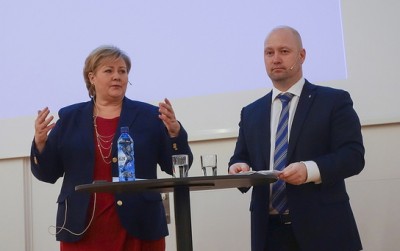UPDATED: Two embattled government ministers have survived apparent moves to unseat or rebuke them. Prime Minister Erna Solberg and the government itself, however, are learning just how hard it is to hang on to power and are struggling to survive themselves.

Justice Minister Anders Anundsen of the Progress Party seems to have survived a move to unseat him, after one of the government’s two support parties opted against expressing a lack of confidence in him.
On Wednesday, Norwegian Broadcasting (NRK) also reported that there’s no majority in Parliament to rebuke Health Minister Bent Høie of Solberg’s own Conservative Party. Høie has been under fire for allegedly letting it be known that he favoured building a new hospital in Molde instead of Kristiansund, when the decision was supposed to be left up to the regional health board. Many doctors, professors and political analysts, however, claimed the criticism against Høie was unjustified, and the government’s two support parties agreed.
Anundsen, meanwhile, has been under fire on a variety of fronts, and still faces criticism over recent deportations of children whose parents’ applications for asylum were rejected. The Christian Democrats party, which wants the families to be allowed to stay in Norway, has accused Anundsen of violating the support agreement it has with the government on the issue.
The Christian Democrats were ready to handle a proposed “lack of confidence” measure against Anundsen when its Hordaland chapter met last weekend. The heated asylbarna (asylum children) issue could have cost the government a majority in Parliament, but the Christian Democrats decided “to give the justice minister a new chance.”
Weakest poll ever
Now the government itself needs voters to give it another chance as well, after the latest public opinion polls showed the weakest support numbers ever for the minority coalition. Its lead party, the Conservatives, held just 21.7 percent of the vote in the poll conducted by research firm Respons for newspaper Aftenposten.
That’s just half the support currently commanded by the Labour Party, which now towers over the other parties with 41.1 percent of the vote, according to the poll released this week. It indicated that Labour has gained nearly 11 points since the election results of 2013 that paved the way for the current Conservatives-led government coalition.
The Conservatives’ government partner, the Progress Party, has lost even more voter support, chalking up just 9.9 percent in the new poll. That’s down from election results of 16.3 percent in 2013 and its scores of more than 20 percent when the Progress Party was in opposition during the two-term Labour-led government.
Tougher in position than opposition
The new poll results show how it’s much harder to hang on to voter support when in government position than in opposition. Labour and not least the Socialist Left party (SV) also lost voter support during their eight years in office, to a point where SV is now just a shadow of its former self. Voters, it seems, are far more likely to punish than reward, and many long-time Progress Party voters apparently don’t think the party is delivering what it promised, because of the need to compromise once it finally gained government power.
A widening confidence crisis between the Progress Party and the government’s two support parties, like those involving Anundsen, is also to blame, according to political analysts. Not only does the minority government risk losing support in Parliament, voters don’t like “too much chaos and disorder,” Anders Todal Jenssen of the Norwegian University of Science and Technology (NTNU) in Trondheim told Aftenposten.
“The more conflict there is on the non-socialist side, the greater the probability is that one or both of the two support parties will break out of their agreement with agreement with the government and side with Labour,” Jenssen said. Prime Minister Erna Solberg thus has her hands full keeping her coalition together, he noted, and her government dream alive.
There have been a few successes of late: A local court sided with Anundsen’s attempt to continue to confine Islamic cleric Mullah Krekar, for example, and he was winning support for police reform. Solberg, meanwhile, seemed to remain calm in the storm, and was busy Wednesday morning speaking at an energy forum in Oslo.
newsinenglish.no/Nina Berglund

